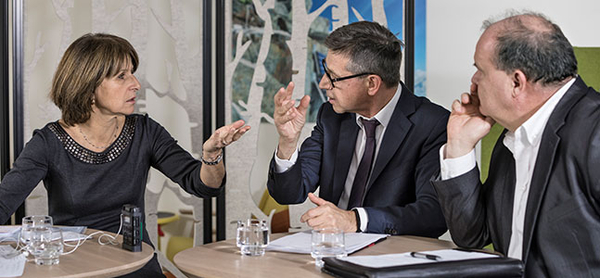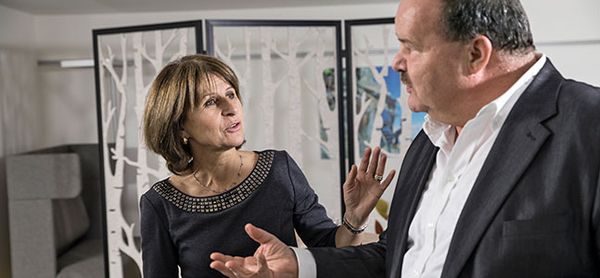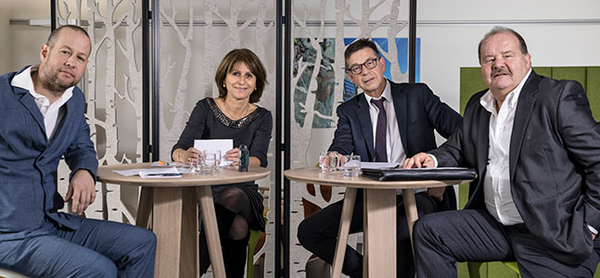Good work, but improve the dialogue with parliament

The SNSF has too weak a presence in the federal capital. That is the unanimous opinion of Christine BulliardMarbach and Felix Müri from the National Council’s Science, Education and Culture Committee (SECC). However, they disagree on the question of how much money is realistic for research funding.
Christian von Burg: How well is the Swiss National Science Foundation doing its job? What mark would you give Mr Egger?
Felix Müri: I’d give him eight out of ten. The SNSF is an important institution, and the way it distributes money seems to work well. But we in parliament don’t hear enough from you, Mr Egger! Invite us over, or let us know when you have a problem. But don’t wait until our Committee is discussing the crucial issue of how much money the federal government should invest in research and innovation over the next four years. Get in touch a bit sooner, then you’ll get ten out of ten next year (laughs)!
Matthias Egger: I’d be very happy to invite you over, Mr Müri. Come to an evaluation meeting, where we discuss which research projects we’re planning to fund and which we’re not. That’s challenging work. We have to identify the best projects without letting other factors distract us.
Christine Bulliard-Marbach: I’d be happy to drop in too because I see things the same way as Mr Müri. The SNSF is doing a good job, Mr Egger, but you could improve the dialogue with parliament.
Is the SNSF distributing its funding fairly? For example, even though the number of women receiving funding has grown continually, it is still considerably lower than the number of men receiving funding. Is that a problem?
Bulliard-Marbach: The way I see it, gender is an important issue for the SNSF. In the same way as it works hard to support young researchers, it also tries to promote women. You have special funding tools for them, of course.
Egger: Yes, and despite that, gender equality is still a problem in science. There are more women doctoral students at our universities than men, at least in the life sciences, biomedicine and social sciences. But if we keep following the scientific career tracks, the number of women decreases. Finally, when we get to professor level, women only account for around 20 per cent of the total, or even just 10 per cent in the STEM subjects. That isn’t good, and it diminishes the innovativeness of Swiss research. We’re therefore rethinking the selection criteria, such as the mobility criteria. It isn’t easy for women with young children just to quickly move abroad. But equality is an issue for the politicians too.
Bulliard-Marbach: It is a problem, and one that parliament has been grappling with for a long time – for instance in connection with incentive funding for new child day-care places.
Müri (mischievously): We’ve been incentivising those for a long time now.
Bulliard-Marbach: Yes, but the day-care places are important if we want to make any progress with equality.
Müri: We’re talking about the SNSF here. And the SNSF has a clear mandate to promote research, not gender equality policy.
Egger: Yes, it does! It’s even explicitly mentioned in the Federal Act on the Promotion of Research and Innovation. We do have a mandate to promote women in research, but we’re finding that the tools available to us aren’t getting us very far.
Müri: So does that mean that if I have two projects, but the money I have for research promotion is running out – does that mean the woman gets the money?
Egger: No, certainly not.
Müri: That’s what I wanted to hear!
Bulliard-Marbach: The woman gets the money if she’s good and if her research is outstanding. Only then does she get it.
Müri: Agreed.
Mr Egger, the SNSF has been committed to open access – free access to research results in other words – for some time now. Your aim is to make all results from publicly funded research available to everyone free of charge. At present, that’s only true of 50 per cent of the projects funded by the SNSF. Why are things going so slowly?
Egger: Compared with other countries, 50 per cent is a very good result. That said, it’s definitely not acceptable for research findings generated with public money to stay hidden behind big publishing companies’ paywalls. We intend to put a complete stop to it from 2020, that’s a goal we’ve set ourselves.
Bulliard-Marbach: The SECC also thinks open access is an important issue.
Egger: But Switzerland doesn’t have the right of secondary publication like other countries do. Having these rights would put researchers in a much stronger position when dealing with publishers. They would have the right to publish their results in paying journals, but they would also be able to make them openly accessible. We would be grateful if the Committee could discuss the issue and make the necessary submission.
Bulliard-Marbach: I’ll be happy to take it up (makes a note). There you are, I’ve noted it.
Egger: Yes, but I came to you once before and said exactly the same thing. But then the Committee didn’t address the topic.
Müri: Then you should follow it up, that’s how politics works. It’ll then be up to us to see what it costs.
Talking of costs, the SNSF’s expenditure has doubled in the past twelve years to a billion francs annually. You’ll be asking for even more money for the fouryear period starting in 2021, Mr Egger. Why is that?
Egger: It’s essential that we at least maintain our current level of financing or, better still increase it, because the competition isn’t sleeping. China is investing enormous sums in research, while the EU is aiming to double its research budget. If we want to continue taking part in EU research programmes, Switzerland will not be able to avoid increasing the amount of money it contributes.
Müri: Mr Egger is quite right. It’s a good thing as long as both sides benefit, as they do from the Horizon 2020 research programme. I’m not against the EU’s research funding, but I am against shilly-shallying when it comes to parliament handing out money. If we’ve agreed that you’re going to get so much for the next four years, then we should stick to that. Nevertheless, I think we’re going to have to increase funding somewhat in the next four-year period.
But the SVP’s official line is that just pumping more money into research does nothing to promote it.
Müri: I take a different line there. We have various points of view within the party, and that’s healthy. I have problems with the Finance Committee interfering too much in what we do in the SECC.

Ms Bulliard-Marbach, the CVP is often split on these issues too.
Bulliard-Marbach: That’s true. And I fight tooth and nail for my party’s votes every time because it’s crucial that we maintain Switzerland’s position as a research location. It is clear to me that if Switzerland wants to compete internationally, it has no option than to put the money into the EU’s funding pot, on top of the money the SNSF receives.
Müri: Yes, and then we’ll get to a point where the Federal Council says: “Stop, now we have to pay so much more into the EU promotion fund that it’s not worth it anymore.” And that raises a fundamental question: Do we decide how much we spend on research promotion, or the EU? I’m in no doubt that it should be us.
Bulliard-Marbach: Look, Mr Müri: If we want Switzerland to remain a centre of scientific research, we don’t get to consider whether or not we want to be involved in EU research promotion, we have to be involved.
Egger: The really important point is that if Switzerland has full association to the next Horizon Europe research programme, it would be very short-term thinking to simply deduct the extra money it pays into the European fund from national research funding. It’s been shown that countries with good national-level research promotion are also successful at European level, and that enables them to recoup a lot of the money they put into the shared fund.
But there has to come a point where the federal government needs to say: “There’s no more money for research.” Where is that point?
Egger: Let’s look at Silicon Valley. There they invest three times as much money in research as we do here. Alternatively, there’s Israel, which spends substantially more than Switzerland at national level. So we still have plenty of headroom.
Müri: But the government isn’t going to allocate much more money to research promotion overnight. That’s simply not realistic. All policy areas are campaigning for more money.
Bulliard-Marbach: Yes, I think we’ve come back to what we said at the beginning. You need to drop in on the Committee more regularly and make the context clearer. That will put the SNSF and research promotion in a stronger position.
Mr Egger, are you going to have to learn to lobby more effectively in Bern?
Egger: I wouldn’t call it lobbying. Our aim is to inform, present and debate, and we’ll be very happy to do that.

SNSF meets SECC-N
The discussion was between:
- National Councillor Christine BulliardMarbach (CVP, Fribourg), Chair of the Science, Education and Culture Committee of the National Council, (SECC-N)
- National Councillor Felix Müri (SVP, Lucerne), member of the SECC-N
- Matthias Egger, President of the National Research Council of the SNSF
- The discussion was led by Christian von Burg, science correspondent at SRF radio
SEC Committees
The Science, Education and Culture Committees of the National Council and Council of States are responsible for research funding in the federal parliament. The SECC of the National Council comprises 25 members, the Council of States’ Committee 13. The Committees prepare parliamentary business and make submissions to the Councils. In addition, they track political and social developments in their area of responsibility.


